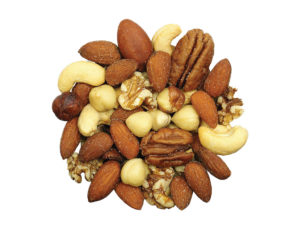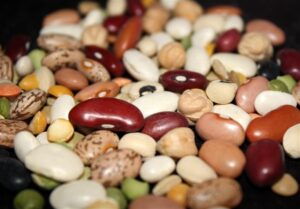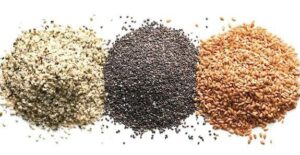In today’s fast-paced world, it’s easy to overlook the importance of good nutrition. Many of us rely on quick meals or processed foods to get through the day, often disregarding the long-term impact these choices can have on our health. The good news? By making conscious choices about what we eat, we can improve our overall well-being and potentially extend our lifespan. Enter “superfoods”—nutrient-packed powerhouses that can help boost immunity, support heart health, and keep our minds sharp. In this article, we’ll explore the top 8 superfoods that can help you live longer and enjoy a healthier, more vibrant life.
1. Berries
Why They’re Super:
Berries—such as blueberries, raspberries, strawberries, and blackberries—are often cited as some of the most powerful superfoods around. They’re packed with antioxidants, especially vitamin C and anthocyanins, which help combat free radicals and reduce inflammation. This makes them excellent for heart health, brain function, and even maintaining youthful-looking skin.

Longevity Benefits:
- Antioxidant Power: The high antioxidant content in berries helps protect your cells from oxidative stress, a leading cause of aging.
- Disease Prevention: Regular berry consumption has been linked to a reduced risk of chronic illnesses like heart disease and certain types of cancer.
- Cognitive Support: Compounds in berries can support memory and cognitive function, helping to keep your brain sharp as you age.
How to Eat Them:
Berries are versatile. Add them to your morning oatmeal, blend them into a smoothie, or enjoy them as a standalone snack for a quick and refreshing pick-me-up.
2. Leafy Greens
Why They’re Super:
Leafy greens like spinach, kale, collard greens, and Swiss chard are brimming with essential nutrients, including vitamins A, C, and K, as well as minerals like iron and calcium. Their dark color indicates a high chlorophyll content, which has been linked to numerous health benefits, including better immune function and detoxification.

Longevity Benefits:
- Nutrient Density: Just one cup of spinach or kale packs a significant portion of your daily recommended vitamins and minerals.
- Heart Health: Leafy greens are known to help lower cholesterol levels and regulate blood pressure, both of which contribute to a healthier heart.
- Bone Strength: Vitamin K helps maintain strong bones, reducing the risk of osteoporosis.
How to Eat Them:
Sauté them with a bit of olive oil and garlic for a tasty side dish, or toss them raw into salads and smoothies to retain maximum nutrients.
3. Avocados
Why They’re Super:
Avocados are often hailed as a “healthy fat” superstar. They’re rich in monounsaturated fats, which are beneficial for maintaining heart health. They also provide a good source of fiber, potassium, and various vitamins, making them an all-around powerhouse for longevity.

Longevity Benefits:
- Heart-Friendly Fats: Monounsaturated fats can help reduce LDL (“bad”) cholesterol levels and raise HDL (“good”) cholesterol levels, lowering the risk of heart disease.
- Blood Pressure Regulation: The high potassium content in avocados supports healthy blood pressure levels, aiding in stroke prevention.
- Nutrient Absorption: Healthy fats in avocados help your body absorb fat-soluble vitamins (A, D, E, and K) more effectively.
How to Eat Them:
Slice avocados over salads, mash them into guacamole, or spread them on whole-grain toast. They’re also a popular addition to smoothies for a creamy texture.
4. Green Tea
Why It’s Super:
Green tea is a popular beverage in many parts of the world and boasts a high concentration of polyphenols and catechins—particularly EGCG (epigallocatechin gallate). These compounds have potent antioxidant and anti-inflammatory effects, which can help lower the risk of several chronic diseases.

Longevity Benefits:
- Metabolic Boost: Some research suggests that green tea can help enhance metabolism and aid weight management.
- Brain Health: The caffeine and L-theanine in green tea can provide a gentle energy boost while supporting mental clarity and reducing stress.
- Cancer-Fighting Properties: Polyphenols may help protect cells from damage, potentially lowering the risk of certain cancers.
How to Drink It:
Enjoy green tea hot or iced without excessive sugar. For a flavor twist, add fresh lemon juice or mint leaves. Aim for two to three cups a day to reap the most benefits.
5. Nuts
Why They’re Super:
Nuts—such as almonds, walnuts, pistachios, and Brazil nuts—are nutrient-dense foods loaded with heart-healthy fats, protein, fiber, and an array of vitamins and minerals. Despite being calorie-rich, the quality of their fat content and overall nutrient profile make them an excellent addition to a balanced diet.

Longevity Benefits:
- Heart Health: The combination of healthy fats and antioxidants in nuts helps lower cholesterol levels and decrease inflammation, reducing the risk of cardiovascular diseases.
- Weight Management: Their high protein and fiber content can help you feel full longer, curbing overeating.
- Mood and Brain Support: Omega-3 fatty acids, especially in walnuts, help maintain brain health and may reduce the risk of cognitive decline.
How to Eat Them:
Enjoy a handful of mixed nuts as a snack, sprinkle them over salads, or use them as a topping for oatmeal or yogurt. Be mindful of portion sizes because nuts are calorie-dense.
6. Beans and Legumes
Why They’re Super:
Beans and legumes—like lentils, chickpeas, black beans, and kidney beans—are excellent plant-based proteins loaded with fiber, vitamins, and minerals. They’re also budget-friendly and incredibly versatile in cooking.

Longevity Benefits:
- Blood Sugar Control: High fiber content helps regulate blood sugar levels, making them beneficial for those managing diabetes or insulin resistance.
- Heart Health: Regular consumption of beans can help lower LDL cholesterol and support healthy blood pressure.
- Longevity Links: Populations that regularly consume legumes, such as those in the Blue Zones (regions known for longer lifespans), often experience lower rates of chronic diseases.
How to Eat Them:
Add beans to soups and stews, mash them into dips, or toss them into salads. Incorporating them into your meals a few times a week is a simple way to boost your overall nutrient intake.
7. Salmon (and Other Fatty Fish)
Why It’s Super:
Salmon, sardines, and mackerel are among the best sources of omega-3 fatty acids—particularly EPA and DHA. These essential fatty acids are crucial for brain function, heart health, and reducing inflammation throughout the body.

Longevity Benefits:
- Cardiovascular Protection: Omega-3s help lower triglyceride levels and blood pressure, reducing the risk of heart attacks.
- Joint Health: The anti-inflammatory properties can help ease joint pain and improve mobility, especially as you age.
- Brain Health: Adequate omega-3 intake has been linked to a reduced risk of cognitive decline and some forms of dementia.
How to Eat Them:
Aim for at least two servings of fatty fish per week. Grill, bake, or pan-sear your fish with herbs and lemon for a delicious and nutritious meal.
8. Seeds (Chia, Flax, and Pumpkin Seeds)
Why They’re Super:
Seeds may be small, but they’re incredibly nutrient-dense. Chia and flax seeds, for instance, are rich in omega-3 fatty acids, while pumpkin seeds provide a hefty dose of magnesium and zinc. They’re also high in fiber, protein, and antioxidants.

Longevity Benefits:
- Heart Health and Inflammation: Omega-3 fatty acids in seeds can help reduce inflammation and promote cardiovascular health.
- Digestive Support: Their high fiber content aids digestion and can help maintain a healthy weight.
- Mineral Boost: Pumpkin seeds, in particular, offer a valuable source of magnesium, essential for bone health and energy production.
How to Eat Them:
Sprinkle seeds over cereals, salads, or yogurt. You can also blend them into smoothies or use them as a topping on baked goods for extra crunch and nutrition.
Practical Tips for Incorporating Superfoods
- Rotate Your Choices: Variety is key. Rather than sticking to the same fruits, vegetables, or proteins, try to mix things up. This ensures you get a broad spectrum of nutrients.
- Focus on Whole Foods: Whenever possible, opt for whole, minimally processed foods. Fresh produce, whole grains, and organic options can maximize nutrient intake.
- Balance Is Essential: While superfoods are beneficial, it’s important to remember that a balanced diet also includes other components like whole grains, lean proteins, and healthy fats.
- Hydration Matters: Don’t forget to pair your superfood-rich diet with enough water. Proper hydration supports digestion, circulation, and overall health.
- Mindful Eating: Lastly, pay attention to portion sizes and enjoy your meals. Eating slowly and savoring each bite can help you tune in to your body’s hunger and fullness signals.
Final Thoughts
Longevity is about more than just living longer—it’s about living better. While there’s no magic pill or fountain of youth, focusing on a nutrient-dense diet can make a significant difference in how we age. Superfoods like berries, leafy greens, avocados, green tea, nuts, beans, salmon, and seeds offer a potent combination of vitamins, minerals, healthy fats, and antioxidants. These not only help fight off chronic diseases but also support cognitive health, heart function, and overall vitality.
Incorporate these superfoods into your daily routine alongside regular physical activity, stress management, and sufficient sleep. Over time, these lifestyle habits can help you maintain optimal health, boost your energy levels, and potentially add years to your life. Remember, it’s never too late to start making healthier choices. Whether you’re looking to fine-tune your diet or completely overhaul your eating habits, embracing superfoods can be an excellent step toward a longer and more fulfilling life.
